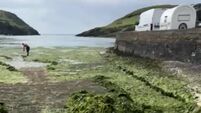'There is awful guilt': Limerick family seeks answers to Epilim scandal

Niamh Barry at her home in Askeaton. Her daughter is one of hundreds affected by the epilepsy medication Epilim being prescribed during pregnancy.
Niamh Barry was hit with “awful guilt” when her young daughter was diagnosed with foetal valproate syndrome linked to epilepsy medication Niamh took while pregnant.
Two years after that heart-wrenching moment, the Limerick family still wants answers about the prescribing of valproate, sold in Ireland as Epilim.















